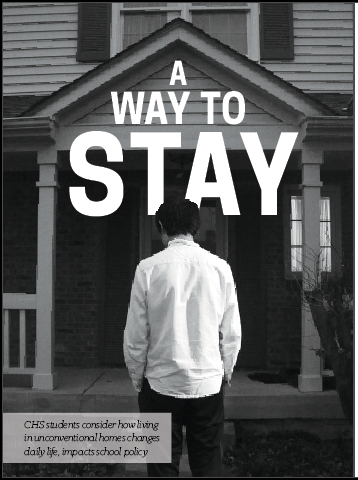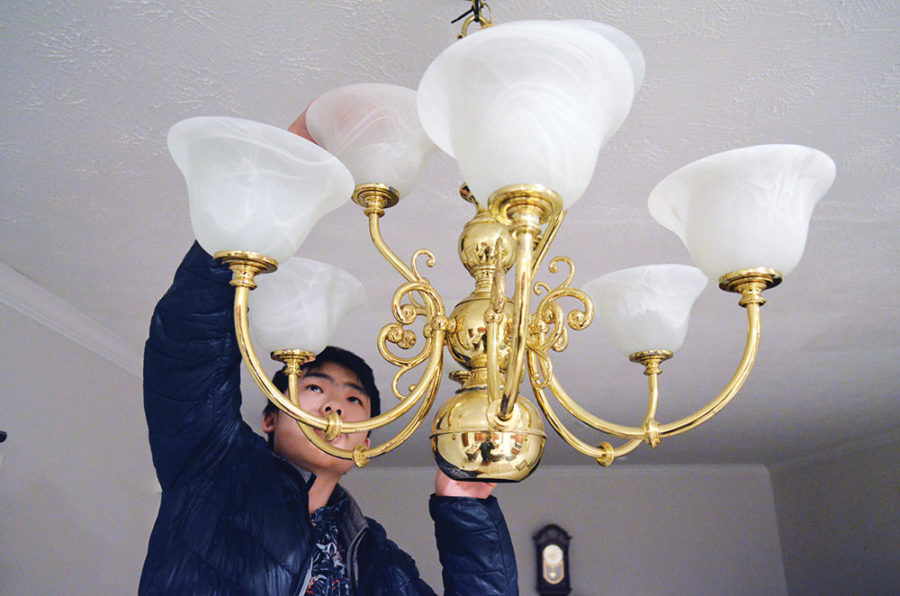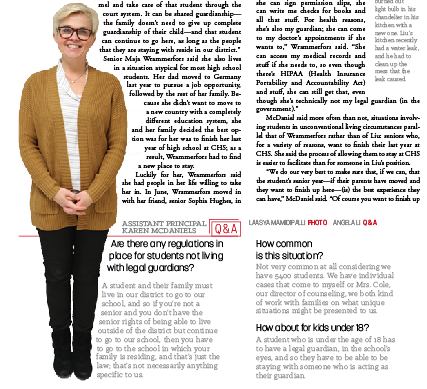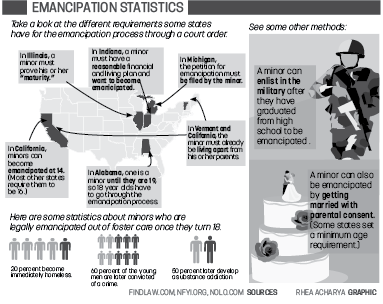
Last January, junior Yueze “Jimmy” Liu came home to a flooded basement. He had just returned from a vacation, only to find the pipes frozen and water everywhere. While most students his age would simply leave their parents to deal with it, Liu solved the problem on his own not because he wanted to but because he had no other option: He lives alone.
In fact, Liu has been living alone for two and a half years. After his parents got divorced in middle school, Liu’s mom moved to Ohio for work while his dad moved back to China. Liu, on the other hand, convinced them he would be able to live independently in Carmel so he could continue to have the opportunities available to him at CHS.
“The extracurricular clubs I stay in Carmel for are probably not going to be provided at my new school (where my mom lives) because the size is too different. My new school is 500 people while Carmel is 5,000,” Liu said.
It is illegal for minors to live alone in the United States. However, Liu said he was unaware what he was doing was against the law—as someone who was used to staying home alone for shorter periods while his parents went on business trips as a child, he said his parents and he decided this arrangement would work over an extended time.

Liu also said in Chinese culture, unlike here, it is legal—though still frowned upon by society—for parents to leave their children alone. He said this situation mainly happens when parents think leaving their children in an area with superior schooling or other opportunities will provide them with a better life.
“(Chinese society) sees it as it’s bad, because some of them leave their children as early as age 5. They’re in extreme poverty, so both of their parents are working and can’t afford the housing in the city, so in order for their children to suffer less than they have, they just left their children at home,” Liu said. “The little kid who is 5 has to learn to cook, or whatever, on their own.”
Though this was fine for Liu and his parents, he was still violating federal laws and school policy by living without a legal guardian. This year, after a situation in which Liu had to switch bus locations, the school became aware of his unconventional living situation and took action to address this violation.
Liu said administrators notified him that in order to continue his education at this school, he had to legally live with a parent or guardian, causing him to choose between either finding a way to transfer guardianship to an adult who can take him in or move in with his mother in Ohio next semester.

While Liu’s situation is unique, it is not unheard of for students to make arrangements to live without their parents to stay in Carmel.
Assistant Principal Karen McDaniel said at CHS, it is fairly atypical for students to live in living situations like this, but the school takes care of each individual student going through these circumstances on a case-by-case basis. She said since most students are minors, they must live with a legal guardian that either has full or shared guardianship over them in order to continue attending CHS if they are living with someone other than their parents.
McDaniel said, “If (a student’s) family moves away, then guardianship—legal guardianship—needs to be obtained by the family that is going to remain in Carmel and take care of that student through the court system. It can be shared guardianship—the family doesn’t need to give up complete guardianship of their child—and that student can continue to go here, as long as the people that they are staying with reside in our district.”
Senior Maja Wrammerfors said she also lives in a situation atypical for most high school students. Her dad moved to Germany last year to pursue a job opportunity, followed by the rest of her family. Because she didn’t want to move to a new country with a completely different education system, she and her family decided the best option was for her was to finish her last year of high school at CHS; as a result, Wrammerfors had to find a new place to stay.
 Luckily for her, Wrammerfors said she had people in her life willing to take her in. In June, Wrammerfors moved in with her friend, senior Sophia Hughes, in a shared guardianship situation between Hughes’s parents and her own.
Luckily for her, Wrammerfors said she had people in her life willing to take her in. In June, Wrammerfors moved in with her friend, senior Sophia Hughes, in a shared guardianship situation between Hughes’s parents and her own.
“The school sees Catherine, who’s Sophia’s mom, as my guardian, so she can sign permission slips, she can write me checks for books and all that stuff. For health reasons, she’s also my guardian; she can come to my doctor’s appointments if she wants to,” Wrammerfors said. “She can access my medical records and stuff if she needs to, so even though there’s HIPAA (Health Insurance Portability and Accountability Act) and stuff, she can still get that, even though she’s technically not my legal guardian (in the government).”
McDaniel said more often than not, situations involving students in unconventional living circumstances parallel that of Wrammerfors rather than of Liu: seniors who, for a variety of reasons, want to finish their last year at CHS. She said the process of allowing them to stay at CHS is easier to facilitate than for someone in Liu’s position.
“We do our very best to make sure that, if we can, that the student’s senior year—if their parents have moved and they want to finish up here—(is) the best experience they can have,” McDaniel said. “Of course you want to finish up your last year here, so we do our best to accommodate that, and we do work with families to make sure that we have all of the contact information and we know how to reach parents because they’re still their parents; we still have an obligation to make sure they know what’s going on, but at the same time, work with the guardian of the individual that’s here.”
 In Liu’s case, the school informed him he would have to leave CHS right after they found out about his situation; after talking with administrators and moving in with a host family, however, Liu did extend his time at CHS to at least the end of the semester. Despite his violation of the law, Liu said he was dissatisfied with the school’s response.
In Liu’s case, the school informed him he would have to leave CHS right after they found out about his situation; after talking with administrators and moving in with a host family, however, Liu did extend his time at CHS to at least the end of the semester. Despite his violation of the law, Liu said he was dissatisfied with the school’s response.
Liu said, “To me, (the school’s response) was unfair. At least give me some warning to finish the semester, to finish up my grades, so I can have a smooth transition (to a new school). However, I didn’t have that chance, which is why I had to disobey the school’s decision.”
Ultimately, Wrammerfors agreed with McDaniel and said decisions should be based on what is best for the individual student and their needs.
“I’ve been really lucky to have families that have loved and cared for me (but) I don’t think it is for everyone,” Wrammerfors said. “I think the focus needs to be on what’s best for the kid, and yeah, for me, it’s being here, it’s being in the United States, finishing high school and living with my best friend; but for some people, it might be living alone, or living with their parents or their brother or friend. I just think the focus should be on the individual, the student who’s trying to thrive.”
Liu said for him to comply with federal and school guidelines, he will likely move in with his mother in Ohio at the end of this semester. He said because he is so used to living without parents, this will be a difficult adjustment for him.
“I think (not having emotional support from my parents) might be a small inconvenience, but there was nothing I could do about it, so there’s no need to have grief over it if I can’t get it anyways,” Liu said. “I do not really see a reason for why I should have parents around, because I can already do all these things (housework, paying the bills, etc.), so having a parent near me is not that big of a deal.”

































![AI in films like "The Brutalist" is convenient, but shouldn’t take priority [opinion]](https://hilite.org/wp-content/uploads/2025/02/catherine-cover-1200x471.jpg)









































![Review: “The Immortal Soul Salvage Yard:” A criminally underrated poetry collection [MUSE]](https://hilite.org/wp-content/uploads/2025/03/71cju6TvqmL._AC_UF10001000_QL80_.jpg)
![Review: "Dog Man" is Unapologetically Chaotic [MUSE]](https://hilite.org/wp-content/uploads/2025/03/dogman-1200x700.jpg)
![Review: "Ne Zha 2": The WeChat family reunion I didn’t know I needed [MUSE]](https://hilite.org/wp-content/uploads/2025/03/unnamed-4.png)
![Review in Print: Maripaz Villar brings a delightfully unique style to the world of WEBTOON [MUSE]](https://hilite.org/wp-content/uploads/2023/12/maripazcover-1200x960.jpg)
![Review: “The Sword of Kaigen” is a masterpiece [MUSE]](https://hilite.org/wp-content/uploads/2023/11/Screenshot-2023-11-26-201051.png)
![Review: Gateron Oil Kings, great linear switches, okay price [MUSE]](https://hilite.org/wp-content/uploads/2023/11/Screenshot-2023-11-26-200553.png)
![Review: “A Haunting in Venice” is a significant improvement from other Agatha Christie adaptations [MUSE]](https://hilite.org/wp-content/uploads/2023/11/e7ee2938a6d422669771bce6d8088521.jpg)
![Review: A Thanksgiving story from elementary school, still just as interesting [MUSE]](https://hilite.org/wp-content/uploads/2023/11/Screenshot-2023-11-26-195514-987x1200.png)
![Review: "When I Fly Towards You", cute, uplifting youth drama [MUSE]](https://hilite.org/wp-content/uploads/2023/09/When-I-Fly-Towards-You-Chinese-drama.png)
![Postcards from Muse: Hawaii Travel Diary [MUSE]](https://hilite.org/wp-content/uploads/2023/09/My-project-1-1200x1200.jpg)
![Review: "Ladybug & Cat Noir: The Movie," departure from original show [MUSE]](https://hilite.org/wp-content/uploads/2023/09/Ladybug__Cat_Noir_-_The_Movie_poster.jpg)
![Review in Print: "Hidden Love" is the cute, uplifting drama everyone needs [MUSE]](https://hilite.org/wp-content/uploads/2023/09/hiddenlovecover-e1693597208225-1030x1200.png)
![Review in Print: "Heartstopper" is the heartwarming queer romance we all need [MUSE]](https://hilite.org/wp-content/uploads/2023/08/museheartstoppercover-1200x654.png)



